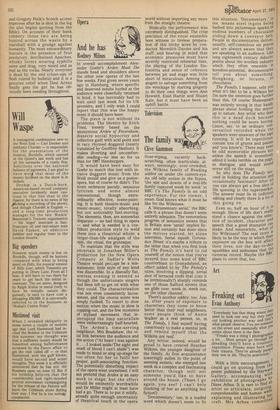Opera
And he has
Rodney Milnes
In overall accomplishment Alexander Goehr's Arden Must Ihe stands head and shoulders above the other new operas of the last few weeks. First given seven years ago in Hamburg, where specific and deserved insults hurled at the audience were cheerfully returned in kind, it has inevitably had to wait until last week for its UK premiere, and I only wish I could report that this was the happy event it should have been.
The piece is not without its problems. The libretto by Erich Fried, loosely based on the anonymous Arden of Feversham, dissects social hypocrisy and collective guilt with acid point and in racy rhymed doggerel (neatly translated by Geoffrey Skelton). It makes diverting and uncomfortable reading—no less so for us than tor 1967 Hamburgers.
It would have been easy for Goehr to match this text with incisive doggerel music from the Weill mould and give us a posteropera, but of course he didn't. The score embraces parody, sensuous lyricism and some almost conventional, though extraordinarily effective, scene-painting. It is both theatre-music and music-music, totally absorbing, but not noticeably fast-moving. The elements, then, are somewhat disparate — no bad thing in opera — and what is needed is a confidant production style to weld them into a theatrical whole: a larger-than-life amalgam of the epic, the ritual, the grotesque.
To maintain that the style was uncertain in Jonathan Miller's production for the New Opera Company at Sadler's Wells Theatre would pernaps be a misstatement: little style of any kind was discernible. In a dismally flat, aimless evening it seemed as though the unfortunate singers had been left to get on with what they could. The characterisation was not even consistently inconsistent, and the chorus scene was simply funked. To resort to slow motion when the music is slow is copping-out, and the few moments of stylised movement that interrupted the limp naturalism were embarrassingly half-hearted.
The Arden's time-serving neighbour, Mrs Bradshaw, the vital link between the audience and the action ("At heart I was against
... I looked aside/The sight and smell of blood I can't abide") was made to stand or sing up-stage far too often for her to fulfil her proper, guilt-associating function. The potentially disturbing impact of the opera went unrealised. I will not pretend that Arden is an easy work to stage, but the effort would be eminently worthwhile and Dr Miller might at least have had a go. There is, to put it mildly, already quite enough uncertainty of theatrical touch in the opera
world without importing any more from the straight theatre.
Musically the performance was extremely distinguished. The crisp precision of the vocal ensemble bore witness to tireless preparation of this tricky score by conductor Meredith Davies and his staff, and bearing in mind that economic pressures must have severely restricted rehearsal time, the playing of the London Sinfonietta and sense of cohesion between pit and stage was little short of miraculous. Among the singers to salvage something from the wreckage by starting gingerly to do their own things were Ann Howard, Enid Hartle and Stuart Kale, but it must have been an uphill battle.


































 Previous page
Previous page